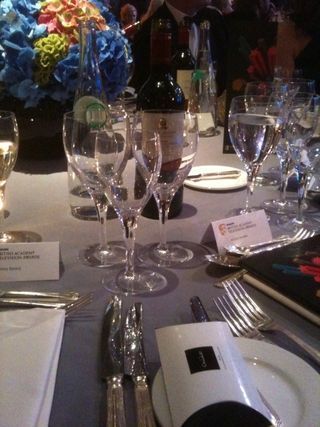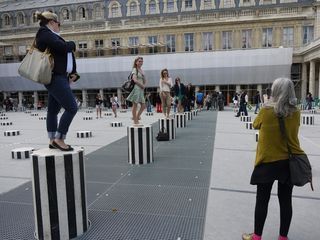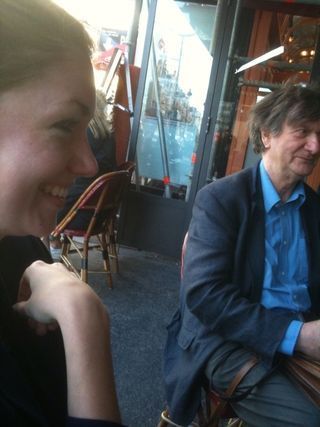Mary Beard's Blog, page 66
June 2, 2011
Cambridge University Chancellor: the race, the runners and riders

You may, understandaby, have missed the fact that the Duke of Edinburgh is to stand down as Cambridge University Chancellor (a largely ceremonial role -- but sticking up for the Uni in the media, plus a bit of fund raising, is thought to be a good added extra).
The Duke has held the job for as long as I can remember (since 1976), and I must say that I assumed that it was more often than not a royal job. How wrong could I have been? OK Prince Albert had a go in the mid 19th century, but that was unusual. But before Philip it was the scientist Lord Adrian (my friend and colleague Lucy's father in law), and before him it was Lord Tedder (a war time RAF leader and 2.2 from Magdalene, of whom I confess I hadn't much heard). Before that it was Jan Smuts (who had problems with the Cambridge fees -- we'll ee that again I guess -- but got a first at 1893), and before him there was a couple of ex-prime-ministers (Baldwin and Balfour).
Anyway, the official candidate now is Lord Sainsbury, who has already given more that £82 million to the University (no connection). And I was beginning to feel rather pleased at the relative meritocracy of the nomination.
But now it looks as if we will have a competition.

From the red corner comes (if he can get enough signatures) is Abdul Arain, who is campaigning on the anti-Sainsbury platform -- in the sense that he wants to keep out a new Sainsbury supermarket from Mill Road and this will give him some much needed publicity. (OK Lord S isn't any longer connected with the company, but he has the same name....)
And from the other red corner, comes the students' favourite Brian Blessed. This is a more puzzling one. I mean, how come the young persons' favourite is someone that most of them couldnt possibly remember (as Fancy Smith in Z-cars... and then as Augustus in I Claudius ..."Is there anyone in Rome who has not slept with my daughter?")? What happened to radical politics eh?
I'm hoping that it will come to a vote. If it does, I shall probably toe the management line, middle-aged trimmer that I am. But a bit of local democracy (and a bit of publicity to the "Keep Supermarkets out of Mill Road" campaign) will be no bad thing.
May 29, 2011
Addenbrooke's...no flowers please

I hope this isn't tempting fate, but I havent had much to do with hospitals laterly. But my old Director of Studies is currently getting better in Addenbrooke's and I have been a (small) part of the visiting team. So I now realise how out of touch with the style of a 21st century hospital I have become.
On the day of my first visit, I realised that I had forgotten to get any flowers for the house. "It's OK," I said to the husband, "I'll get some at Addenbrooke's; they'll be pricey, but they are bound to sell them."
How wrong can you get? There were none on sale and Joyce's ward was clearly a flower-free zone. So what has happened. Are flowers supposed to spread germs? Are they a health and safety hazard (water and broken glass over the floor and very expensive equipment)? Or are they a waste of nurses' time, who have a lot more important things to do than being amateur florists?
There may be something in all this. I doubt that there is any clear evidence for your average bunch of friesias spreading MRSA, but -- yes -- I would prefer the nurses were saving my life, not primping my flowers. All the same, I smell a bit of a rat. If flowers are such spreaders of disease, then how come they are allowed (and even encouraged -- see bottom right of the link) in private hospitals? Is it because private hospitals are more laid back about infection, because patients are largely in private rooms? Or are they more committed to the idea of being ill having its compensations (at least some nice flowers...)?
Addenbrooke's, overall, does seem a bit dour. Sure, I realise that I am lucky to be living near one of the country's best hospitals (and if I am whisked in tomorrow, nurses and doctors please don't hold this blog against me). But does it really have to be so "lecturing" and downmarket. Do you have to be punished for being ill?

When I visited today, there were improving messages being broadcast over the tannoy as you walked in. Please don't visit if you have had diorrhoea recently; make sure you bin your snotty tissues etc. And almost every surface had been colonised by an improving notice. Never have I wanted a cigarette more than when confronted with this battalion of prohibitions. And there was not much sense of humour in  evidence ("Operating on this site", above, didnt mean what you might think it would in a hospital).
evidence ("Operating on this site", above, didnt mean what you might think it would in a hospital).
And -- apart from a nice mural by Quentin Blake -- the "concourse" felt like a motorway service-station, with pretty seedy outlets. If this is meant to be a place where patients, who are well enough, can wander with their visitors -- why not have a nice place where they can sit down with waiter/waitress service, at a reasonable price. If it's all privatised, then why can't we get Jamie interested -- or Pizza Express. A bookshop even?
Please dont strike me down with awful illness for writing this. We have a wonderful hospital here in Cambridge, cant we give it a sense of pleasure too?
May 26, 2011
Heffers' Classics favourites

If you want your local bookshop to survive, you have to get off your arse to support it. One thing is to buy stuff there (Amazon may be wonderful, but you can't browse in the same way, or fully test drive the product before you read it -- and I doubt that Amazon will ever have on your doorstep tomorrow some of the specialist Classics books that Heffers has on the shelves). Another is to participate in events there, like 150 plus of us did at Heffers last night -- which you cant do on-line. On-line engagement with the Amazon site tends to be a pretty solitary thing.
Heffers was hosting a Classics event. This was partly to celebrate the 100th anniversary of the Loeb Classical Library (which is apparently about to go digital); partly to celebrate great Classics books in general. Four of us -- me, Paul Cartledge, Tom Holland and Michael Scott -- had a few weeks ago chosen up to 10 of our favourite Classical books to be publicised in a Classics "drive" within the shop.
Last night we were asked to pitch a couple of them, in 3 minutes-ish, to an audience who were enjoying a late night book shopping trip, with a glass or two of wine.
So what did we choose?
Well Tom couldn't bring himself to select, so whizzed through his whole ten (starting with Asterix, and including Lane Fox's Pagans and Christians and, yes allow me this, my Triumph book). Michael picked Dodds's Greeks and the Irrational, Settis's The Future of the Classical, and Price and Thonemann's Birth of Classical Europe. Paul kept himself to one title and picked Mary Renault's Last of the Wine (with a wonderfully personal speech about falling in love with it when he was at school).
I went for two: first, Vernant's The Universe, the Gods and Mortals. which is about the most revealing retelling of Greek myths that there is (I said yesterday that I often stood in bookshops watching people buying Robert Graves's Greek Myths -- and wanting to intervene and say 'stop..it looks like a sensible handbook, but it is actually mad Mother Goddess stuff'); second, Kennedy's Latin Primer, because of the wonderful sense of control it offers over the Latin language itself -- not to mention the "memorial  rhymes" at the back (and the Molesworth cartoon of Kennedy leading the gerund into captivity)
rhymes" at the back (and the Molesworth cartoon of Kennedy leading the gerund into captivity)
So what would you recommend as a great Classics book for the general reader? suggestions please. And meanwhile congratulations to Heffers for a great book evening.
May 23, 2011
Not winning a BAFTA (...phew???)

Last night was BAFTA night. The Pompeii documentary that I had been part of was nominated for an award in the Specialist Factual category ... so we all got dressed up in our best to go to the awards ceremony at the Grosvenor House Hotel.
Needless to say, I am not a regular at this kind of event, and found myself full of both admiration and loathing at the whole slickness of organisation. I met up with some members of the team (Richard , and on her first post-baby outing -- just remember, ladies, how wonderful and stressful that is!) in the bar of the Dorchester, before we drove up to the red carpet at the awards HQ.
This is where admiration and loathing kicks in. You get out of your car and instantly the ushers know whether to to say "to the left" or "to the right".. On the left are the paps, with their cameras getting the celebs; on the right are the poor bloody public who have really come to see the celebs, but actually get M Beard et al walking along.
Admiration? Well.. it IS fantastic how these guys instantly know whether you are photo-worthy or not. Loathing? Well, obviously don't get me going on celeb culture.
Inside, after a glass of champagne, I was on a BBC table -- with mates and new mates (including , son of a Cambridge colleague who made "Human Planet" nominated in the same category as we were). And we waited till out category.
We didnt win.
 Now lets be honest. If we had won, I would have been very pleased and drunk more champagne than is wise (never mind having to give a lecture at 9 o'clock this morning); and would particularly have celebrated the success of those members of the team whose professional award this is (I guess getting a BAFTA is a bit like becoming an FBA in my day job).
Now lets be honest. If we had won, I would have been very pleased and drunk more champagne than is wise (never mind having to give a lecture at 9 o'clock this morning); and would particularly have celebrated the success of those members of the team whose professional award this is (I guess getting a BAFTA is a bit like becoming an FBA in my day job).
But was I disappointed? In retrospect I dont think so. Of course, the whole occasion gears you up to want to win. (That's rather like academic job applications... you might apply for them when you are young just as a practice run, not expecting to get them, but once you have finished the application, you find you are a bit invested in the whole thing.)
But within a few minutes, I felt a bit of relief.
Look, I thought -- this was my first tv programme. It was wonderful -- really wonderful - to be nominated for a BAFTA. Actually to win... that would be a bit different. I mean I am hoping to do a bit more rather austerely popular characterful academic television. How would I have ever lived up to a BAFTA for my first shot at the genre? Wouldnt it always have been a bit of a ;poisined chalice?
So thank you all ... I think I have got just the affirmation that I wanted (in fact more than the approbation and minus the hubris). And I will try to do even better next time.
May 18, 2011
The sentence for "serious" rape?

The most depressing thing about the most recent version of the "rape debate" is way it has come down to how long the rapist should be banged up for. The worse we think the crime, the longer they should spend in clink. For what?
On the Today programme this morning Vera Baird was attacking the proposal that rapists who pleaded guilty should have a 50% sentence reduction. The argument was that if the average sentence for a rapist was 5 years, then a 50 % reduction meant 2.5 year which with remission for good behaviour would mean 15 months. Just 15 months, she said.. for rape?
Well, there are all kind of factors to weigh up here. As Ken Clarke has pointed out the 'average' sentence includes those sentenced for 'statutory rape'. for any sexual encounter with those aged under 16 however consensual. So the 5 year average is already an odd, and far from from average, figure.
But leaving those figures aside, and assuming the 15 months sentence, is that a fair punishment?
That's where the 'bang em up" mentality seems hopelessly misguided. Most websites today have deplored the idea that a rapist should be let out in under 2 years. WOT 15 months for rape?
No-one stopped to say.. well 15 months in the nick, that means total loss of job, probable mess of any family relationship, disintegration of family itself (ie punishment for them), plus the conversion of a wrongdoer into a hardened criminal (that's what prisons do). Well done judicial system. Cant we think of something more humane and better and more designed to stop them doing it again? Isnt there something we can do better for the victim as well as the perpetrator?
Now before you say: you wouldn't say that if you had been raped .. let me say I have been raped.
You can read the story here. On the Clarke scheme, it was slightly less than the most serious, but not at the bottom of the heap. I have to say that I agree with him that there are gradations in this crime. I didnt think of going to the police but, if I had, I would have thought that my rapist deserved far less a penalty than if he had jumped at me with a knife or a gun ( I never felt in mortal danger).
And if I had pressed charges, I dont actually think that I would have wanted the guy banged up. I really, really would like him not to have done it again, and I would have liked to have got the chance to tell him what a tosser he was .. but I dont think I would have wanted to have ruined his life, as he didnt -- in the end -- ruin mine.
I know I may be tougher in all sorts of ways that other victims of rape; but that doesnt mean that my views shouldn't be heard too. The thought that he would have been in a jail for years would NOT have been my dream or desire. I would much have much preferred that he spent a long series of weekends picking up rubbish in a seedy Italian town, or using his skills (he was an architect) for free, in the city planning of Italy. Or actually just saying sorry. (If the biscuit factory architect is reading this, he still can say sorry...)
But overall it has been a bad week for those of us who worry about the modern obsession with imprisonment. The Today Programme also revealed that the maximum penalty for passing off penalty points for speeding onto someone else was life imprisonment (it's perverting the course of justice).
Have we all lost our marbles?
May 15, 2011
Newnham to the Louvre

Yesterday I went (with husband and third year Newnham Classicists) for a day at the Louvre -- early Cambridge start, museum, lunch (above, my grappa), more museum, and back in time to tumble into bed.
It was the first time I had seen the Louvre's "re-hang" of the classical sculpture. It is visually very attractive -- I particularly liked the two Roman versions of the Capitoline Aphrodite lined up next to each other, as twins -- but the labels are out of the ark.
Every marvellous bit of Roman post modernism is labelled as if it was some Greek "original", and only in small letters confessed to be "Roman" in date and patronage and dissemination. There's Praxiteles' lovely little Sauroctonos, but it's only by very close reading of the text that you find out that this particular statue is not by Praxilteles at all...but was done 500 years or so later by a clever Roman imitator.
An extraordinary denial of Rome.. in a Museum that is really all about Rome.
That said, the students (and me and the husband) got a huge lot out of autopsy, as always. We all agreed  that you couldnt understand size unless you actually saw the piece: the Venus de Milo was bigger than everyone expected, the sleeping hermaphrodite smaller. And
that you couldnt understand size unless you actually saw the piece: the Venus de Milo was bigger than everyone expected, the sleeping hermaphrodite smaller. And  there were other surprises. I had forgotten (if I ever knew) that there were some herms (on the right) found in 1820 along side the Venus de Milo (does anyone understand the context?).. now nicely displayed next to her. And we had a great time looking at a proto Corinthian pot showing the murder of Ismene by Tydeus (what myth is that? and dont just direct me to the fragement of Mimnernus please, it doesnt really help).
there were other surprises. I had forgotten (if I ever knew) that there were some herms (on the right) found in 1820 along side the Venus de Milo (does anyone understand the context?).. now nicely displayed next to her. And we had a great time looking at a proto Corinthian pot showing the murder of Ismene by Tydeus (what myth is that? and dont just direct me to the fragement of Mimnernus please, it doesnt really help).
Anyway, this was the annual pre-Tripos Newnham jaunt. Cambridge to the Louvre and back in a day, lunch included. It is hugely fun, and about the best kind of revision you can ever do, getting up close to some half familiar works of classical art.

I said to the husband, as we left, that in my dreams I would start off the Classics course at Newnham with a load of trips like this... sod the syllabus, why not spend the first term going round museums etc and THINKING about things. But he rightly said that the reason that the third years -- Amy, Avril, Emma, Hadden, Helena -- could engage with the stuff was that they already knew loads. You couldnt usefully throw first years in at the deep end.
 Which I guess is true, But it is all the same a great experience all round. And if ever I cease to be engaged by clever young women who have loads of questions and observations in a new museum, it will be time for me to change my job. Yes it is a privileged experience for us all, but that is what I think (in all kinds of different ways) Oxbridge offers, to very bright kids from whatever background.
Which I guess is true, But it is all the same a great experience all round. And if ever I cease to be engaged by clever young women who have loads of questions and observations in a new museum, it will be time for me to change my job. Yes it is a privileged experience for us all, but that is what I think (in all kinds of different ways) Oxbridge offers, to very bright kids from whatever background.
And no -- the tax payer doesnt pay a penny. This annual jaunt is largely funded by the money given to Newnham Classics by the parents of a student -- Jane Forshaw -- who tragically died falling down stairs in college years and years ago (plus a tiny top up from yours truly, for self and husband and a few extras). We toast Jane and her Mum and Dad (thanks again Forshaws) as we enjoy the intellectual break.
It's this kind of thing that keeps the whole business worthwhile for me, the best combination of pleasure, learning, and (yes, despite the pics) hardwork.
May 12, 2011
BAFTAs and Emmys

My good news is that the Pompeii programme I was involved with (made by Brave New Media, Lion TV, with the BBC) has been shortlisted for a BAFTA (specialist factual category).Whatever happens at the next stage, that is jolly good news for all of us involved. And it's a reassuring confirmation that people can really appreciate programmes about Pompeii that do not feature CGI versions of exploding volcanoes, or B grade actresses dressed up in revealing Roman kit pouring out the Falernian from a reconstructed Roman bar.
No; instead it was me and Andrew Wallace Hadrill down a real ancient sewer talking about the real ancient shit and the historical secrets it could divulge. The ancient up close and personal and without the distracting frills.
Anyway this means that I will probably get to go along to the ceremony later in the month, where the final winners are announced; and to act the star-struck academic in the midst of the celebrity soap stars, the leading actors from Downton Abbey, plus Stephen Fry ('specialist factual", I have quickly realised, is a bit of a minnow of a category compared with "comedy").
The son and daughter are worried that it will be wasted on me, as I wont recognise enough people to make it worth while (I havent even been watching much Casualty lately, which used to be my regular weekly hospital soap).
But if our experience at the Emmys is anything to go by, it will be fun anyway. We got invited to their awards ceremony a couple of years ago by a friend who organises it... and apart from Mary Tyler Moore and Tina Fey and The Late Show, the hundreds of names and the faces and the shows getting awards were an almost complete mystery to us.
It lasted for hours, and I was particularly worried that the husband, whose tolerance of soaps (particularly those set in American suburbs) is rather less than mine, would not enjoy it a bit. Quite the reverse though. We were both absolutely gripped by the choreography of it and the whole razzammattazz... and that was before the gala dinner.
So I have high hopes for the BAFTAs, win or no-win.
May 8, 2011
What makes a good lecture?

At the airport again. I've just done the last Mellon lecture and am coming back home for good (sadly, because it's been a wonderful time here in Washington).
The last lecture was very much work in progress right up to the last minute. I had it mapped out and pretty much written (bar the last ten minutes) by the time I got to DC on Friday night. On Saturday I went into the office and went over the lot, made the powerpoint better and got the last ten minutes down on paper.
This last bit was the story of what had happened to the Roman sarcophagus from Beirut, believed to have been once occupied by the emperor Alexander Severus and brought back to DC by Jesse Elliott in the late 1830s (in the picture above). He offered it to President Andrew Jackson as a last resting place -- who instantly refused it, because he didnt fancy being buried in an emperor's coffin. Surplus to requirements, it was put on display on the Mall, until the mid 1980s, when it was sadly moved to storage.
This was all a great symbol of some of the big themes I'd been talking about over the last few weeks, pulling together issues of republicanism and monarchy, contested identications .. etc etc ..
In fact, for me, all was going well until about 4.30 on Saturday when I was swinging my legs under the desk and inadvertently disconnected the power supply from the computer. Luckily the autorecovery programme kicked in for the lecture, but not for the bloody powerpoint, which reverted to the form it had been in some time around lunch time. That was another two hours catch up... in the process of which I realised that the end wasn't right either (far too preachy).
So after a great dinner (thanks Sarah and Sheila), I had to get up at 6.00 on Sunday (today)..tinker with the powerpoint and make the end a bit more to the point, more humble and more funny, before clearing up the apartment to vacate, packing up the books from the office to be shipped to the UK, meeting my old friend William for lunch, test driving the powerpoint at 1.00 and turning up at 2.00 for the lecture itself.
Then, virtue rewarded, it went better than I could have ever hoped. In fact, at the end, people got up on their feet and clapped. A 'standing ovation' I guess (not much you can do, but be grateful and gracious and very very pleased... lectures don't have encores). But it did lead me to reflect on what made a good lecture (or lecture series).
In this case, I think what really made the difference was the fact that I was still working on each lecture until the day before (or even the day). So when I gave them, they really were very live in my mind. There are all kinds of wonderful and brilliant things that people can want to get over, but unless the thought processes that gave birth to them are still active and raw, they just wont come across in a lecture format. (As we all know, giving the lecture the second time is never the 'rush' that the first time is. It's more like reading the script.)
But it's a question of the audience too. The great thing for me about the Mellon audience was that they really bought into 'the project', so -- corny as it might sound -- it felt like we were all going somewhere together. And that made a huge difference to my own input.
But now it is back to earth and to term and regular teaching -- and forgetting standing ovations. But thank you Washington DC, very much indeed.
May 6, 2011
Last exit to Washington

When I arrived at my apartment block in Washington last week to give Mellon lecture number 5 (a hubristic attempt to talk about Titian inter alia...) the concierge said as I walked in: "welcome home Miss Mary".
And yes, I thought, Washington HAS become to feel like home (note how I just wrote MY apartment block, as natural as anything). That's partly because I've lived in this little bubble between E St NW and the National Gallery, hardly straying outside it ... and enjoying the kind of wall-to-wall work that I havent for ages. Get up and read, then have coffee and read some more, plunge into the library, until it's time for half a botle of wine and some more reading. (The picture at the head of this post is part of my buble -- the moving walkway between the two wings of the gallery.)
Of course, there's nothing like the fear of facing 500 people on a Sunday afternoon to make you get your ideas and thoughts together . . .
Sorry to gush, but I have had a great time, and the most pleasure has come from some of the simplest things. Number one: people who will share their expertise in whatever, from medieval tapestry to Renaissance drawings (I can't begin to tell you how much more I know about tapestry than I did three months ago; I used to be the sort of girl who would walk briskly through any tapestry gallery...with the speed that my children aged 8 and 10 could go through a gallery of Etruscan sarcophagi). Number two: I never realised how wonderful it was to have a complete run of sales catalogues from all the major auction houses on open shelves in the library; it's amazing what I've found (someone tell me please that we have this in Cambridge...)
Anyway this Sunday is lecture number six; the end . . .

It's going to be partly about the old Roman sarcophagus that Andrew Jackson refused to be buried in (everyone thought it was the sarcophagus of the emperor Alexander Severus and that wouldnt do for a US president). I talked about this in Lecture One, and the end of the story will appear on Sunday... not giving it away yet.
But I'm also talking about the idea of representing modern people as Romans..in the western tradition of portraiture, and how and why it died out. I blogged about this before and some of your suggestions (inc FDR's toga party will come in on Sunday, so thank you all very much).
 Meanwhile I've changed my mind a bit about what the problem/question is. I dont think that we need to
Meanwhile I've changed my mind a bit about what the problem/question is. I dont think that we need to  be concentrating on why we no longer represent our 'leaders' as Romans.. but why no form of representational fantasy is any longer on the agenda of portraiture (Anglo Saxon, Arabian or whatever). One of the consequences of modernism was, I suspect, that mainstream portraits could no longer deal in metaphor; they had to be "realistic" or "sub-realistic". No more Lord Cornwallis as a Roman (as on the right), or Queen Victoria as an Anglo Saxon. or Commodus as Hercules (on left). The change wasnt in other words a rejectio of Rome, but a rejection of any form of the other.
be concentrating on why we no longer represent our 'leaders' as Romans.. but why no form of representational fantasy is any longer on the agenda of portraiture (Anglo Saxon, Arabian or whatever). One of the consequences of modernism was, I suspect, that mainstream portraits could no longer deal in metaphor; they had to be "realistic" or "sub-realistic". No more Lord Cornwallis as a Roman (as on the right), or Queen Victoria as an Anglo Saxon. or Commodus as Hercules (on left). The change wasnt in other words a rejectio of Rome, but a rejection of any form of the other.
How many (mainstream) counter examples?
May 3, 2011
University democracy -- and the end of the Reporter
I have been away and only just caught up with the fact that the excellent University Reporter (the weekly magazine which carries reports of discussions, proposals for change, Tripos regulation, job vacancies, appointments and obituaries etc etc) is going to stop publishing a print edition and go entirely online.
OK, it's no doubt an obvious up front saving, and the info it contains (more than almost any other university in the world shares with its staff) will still be in the public domain online. All the same, it is still the case that in medium sized institutions like Cambridge, print disseminates some forms of information much more quickly and more effectively than electronic media. The combo of an electronic and print edition (as we currently have) has the greatest reach of all.
So what 's the matter with electronic only?
For a start, I already have email overload, at an average of more than 100 a day (I'm sure there are many people with many more), and the temptation to ignore the messages that come from 'the management' is almost irresistible. In my Faculty we get too efficiently circulated with a range of worthy irrelevancies (the message from the central admin that BA may be going on strike, the announcement of a conference on gender politics in ancient sub-Saharan Africa . . . in which I might have been interested unless it had been tagged with that awful by-line "Apologies for Cross Posting" .. ie DELETE).
The point about the Reporter in paper form was that you might just pick it up when a student was late for an appointment and so you might read what your colleagues had to say about some topic that you didnt really realise was interesting. If you ever had time for a cup of coffee, you might take those five minutes to see what was going on. A simple, subtle and clever form of information exchange.
Now it will come into the inbox...and we will have to remember not to delete. But of course we will.
OK, if we want the info, it will still be there. But one of the virtues of a canny democracy is that it puts info in the hands of people when they have a few free moments to take it in, and when they least expect it. And they try to educate those who do not actively seek the information out. That means spending more money up front than seems necessary, but it SAVES money in the long run in an educated and well infirmed citizenry.
And what universities need right now is the best informed workforce they have ever had.
I shall certainly be less well informed. I've been missing the print edition of the Reporter in Washington DC. It wasnt until I got back home that I was told that the change was taking place, though it had been published in the current 'online Reporter' weeks ago...
Let me say that I am sure (well, I hope I'm sure) that the drive behind this was not a cunning plan to keep the info from us. But I am pretty confident that a less well infomed work force will be the result. And that it will cost more money than it appears to save.
Mary Beard's Blog
- Mary Beard's profile
- 4110 followers







